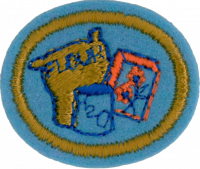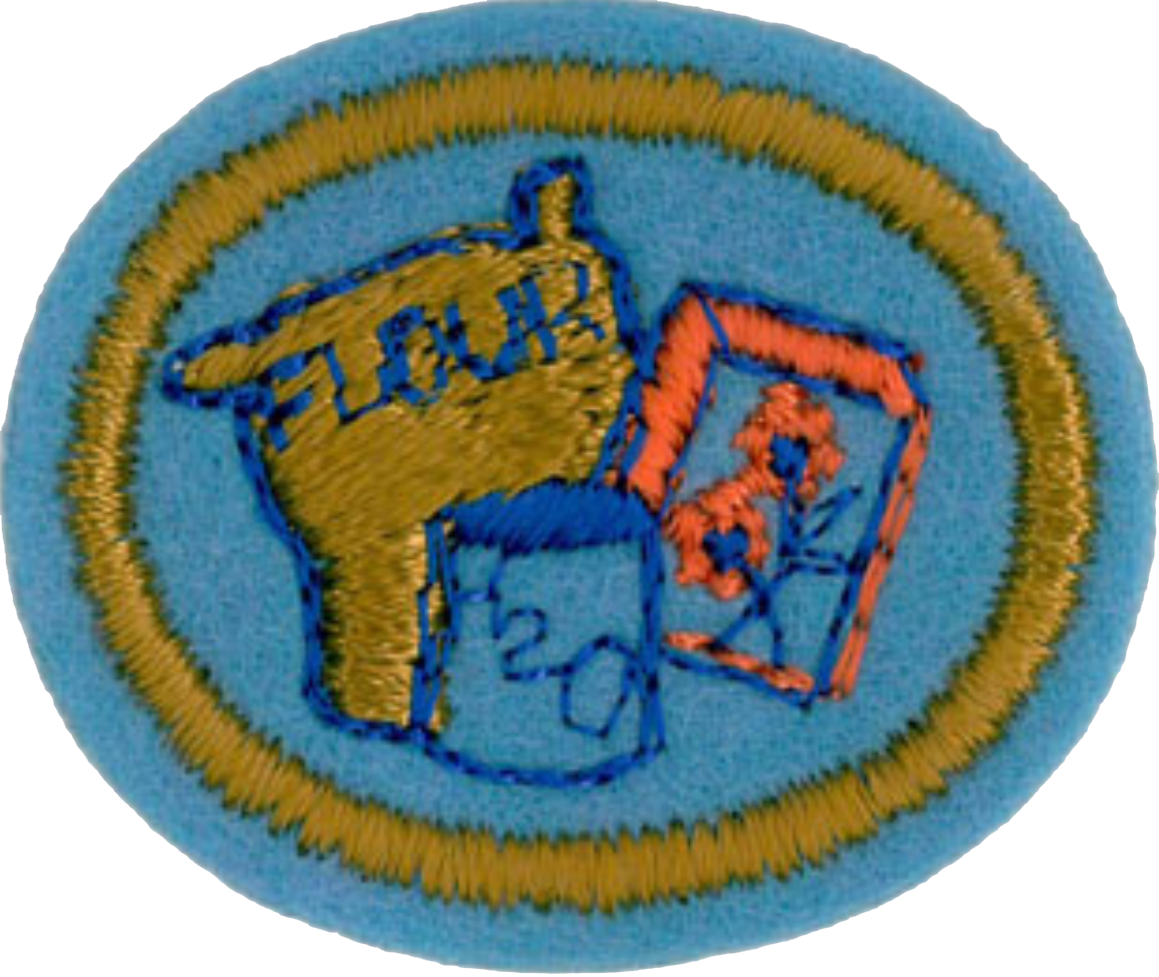Difference between revisions of "AY Honors/Bread Dough/Answer Key/es"
From Pathfinder Wiki
< AY Honors | Bread DoughAY Honors/Bread Dough/Answer Key/es
(Created page with "{{clear}}") |
(Updating to match new version of source page) |
||
| (30 intermediate revisions by 3 users not shown) | |||
| Line 1: | Line 1: | ||
| − | < | + | {{HonorSubpage}} |
| − | + | ||
| − | {{ | + | <section begin="Body" /> |
| − | | | + | |
| − | | | + | {{ansreq|page={{#titleparts:{{PAGENAME}}|2|1}}|num=1}} |
| − | | | + | <noinclude></noinclude><!-- instance 1 --> |
| − | | | + | <!-- 1. Hacer una lista de los materiales y los enseres que se necesitan para el arte en masa de pan. --> |
| − | + | La masa se hace mezclando: | |
| − | + | * 1 ½ tazas de harina blanca | |
| − | + | * 1 ½ tazas de sal | |
| − | + | * 1 cucharada de aceite | |
| − | + | * alrededor de ½ taza de agua (o un poco más). Esto resulta muy parecido a la masa de la marca Play-Doh. | |
| − | + | Si la masa se vuelve demasiado pegajosa, simplemente agregue más harina. Use loción para manos para reducir la pegajosidad. Tenga en cuenta que esta es solo una de las muchas recetas posibles. Diferentes recetas de masa producen diferentes efectos. | |
| − | + | Hacer la masa: | |
| + | # Taza medidora y cucharada | ||
| + | # Tazón para mezclar | ||
| + | # Palo o cuchara para revolver | ||
| − | + | Dar forma y teñir la masa: | |
| + | # Loción de manos | ||
| + | # Cortadores de galletas y rodillo (opcional) | ||
| + | # Cuchillo | ||
| + | # Papel encerado (para trabajar, colocar piezas) | ||
| + | # Papel de aluminio | ||
| + | # Alambre de calibre 18 | ||
| + | # Otros elementos para transferir textura a la masa como una hoja con venas y una red. Busque texturas interesantes a su alrededor. | ||
| + | # Colorante alimentario o colorante para teñir | ||
{{clear}} | {{clear}} | ||
| − | ==2. | + | <noinclude></noinclude> |
| − | + | {{CloseReq}} <!-- 1 --> | |
| − | + | {{ansreq|page={{#titleparts:{{PAGENAME}}|2|1}}|num=2}} | |
| + | <noinclude></noinclude><!-- instance 1 --> | ||
| + | <!-- 2. ¿Por qué es importante tener las manos limpias y usar loción para las manos cuando se trabaja con masa de pan? --> | ||
| + | La masa recogerá cualquier suciedad que pueda tener en sus manos. | ||
| + | La loción evita que las manos se peguen a la masa, lo que facilita su manipulación. | ||
| − | ==3. | + | <noinclude></noinclude> |
| + | {{CloseReq}} <!-- 2 --> | ||
| + | {{ansreq|page={{#titleparts:{{PAGENAME}}|2|1}}|num=3}} | ||
| + | <noinclude></noinclude><!-- instance 1 --> | ||
| + | <!-- 3. Explicar los diferentes procedimientos que se emplean para teñir y pintar la masa. --> | ||
{{clear}} | {{clear}} | ||
| Line 30: | Line 49: | ||
{{clear}} | {{clear}} | ||
| − | ==4. | + | <noinclude></noinclude> |
| − | + | {{CloseReq}} <!-- 3 --> | |
| + | {{ansreq|page={{#titleparts:{{PAGENAME}}|2|1}}|num=4}} | ||
| + | <noinclude></noinclude><!-- instance 1 --> | ||
| + | <!-- 4. ¿Qué tipo de acabado se usa para proteger y dar una apariencia brillante a la masa de pan? --> | ||
| − | ==5 | + | <noinclude></noinclude> |
| − | + | {{CloseReq}} <!-- 4 --> | |
| + | {{ansreq|page={{#titleparts:{{PAGENAME}}|2|1}}|num=5}} | ||
| + | <noinclude></noinclude><!-- instance 1 --> | ||
| + | <!-- 5. Realizar por lo menos dos diferentes flores con hojas como la rosa, la margarita, el narciso, el cornejo, la violeta, el jacinto de uva, el clavel, el lirio, el pensamiento, la amapola, la flor de pascua, el tulipán y la nomeolvides (se puede usar cortadores de masa). Arréglelos usando recipientes de su elección (algunas sugerencias: canastas pequeñas, conchas, olla, etc.). --> | ||
{{clear}} | {{clear}} | ||
| Line 44: | Line 69: | ||
{{clear}} | {{clear}} | ||
| − | ==6. | + | <noinclude></noinclude> |
| − | == | + | {{CloseReq}} <!-- 5 --> |
| − | + | {{ansreq|page={{#titleparts:{{PAGENAME}}|2|1}}|num=6}} | |
| − | + | <noinclude></noinclude><!-- instance 1 --> | |
| − | + | <!-- 6. Realizar uno de los siguientes elementos usando masa teñida: --> | |
| − | + | {{ansreq|page={{#titleparts:{{PAGENAME}}|2|1}}|num=6a}} | |
| − | |||
| − | |||
| − | |||
| − | |||
| − | + | {{clear}} | |
| − | == | + | <noinclude></noinclude> |
| − | + | {{CloseReq}} <!-- 6a --> | |
| + | {{ansreq|page={{#titleparts:{{PAGENAME}}|2|1}}|num=6b}} <!--T:18--> | ||
| + | <noinclude></noinclude> | ||
| − | ==7. | + | <noinclude></noinclude> |
| − | == | + | {{CloseReq}} <!-- 6b --> |
| − | + | {{CloseReq}} <!-- 6 --> | |
| + | {{ansreq|page={{#titleparts:{{PAGENAME}}|2|1}}|num=7}} | ||
| + | <noinclude></noinclude><!-- instance 1 --> | ||
| + | <!-- 7. Realizar una de las siguientes tareas: --> | ||
| + | {{ansreq|page={{#titleparts:{{PAGENAME}}|2|1}}|num=7a}} | ||
| − | == | + | <noinclude></noinclude> |
| − | + | {{CloseReq}} <!-- 7a --> | |
| + | {{ansreq|page={{#titleparts:{{PAGENAME}}|2|1}}|num=7b}} <!--T:20--> | ||
| + | <noinclude></noinclude> | ||
| − | + | {{clear}} | |
| − | == | + | <noinclude></noinclude> |
| − | + | {{CloseReq}} <!-- 7b --> | |
| + | {{ansreq|page={{#titleparts:{{PAGENAME}}|2|1}}|num=7c}} <!--T:22--> | ||
| + | <noinclude></noinclude> | ||
| − | == | + | <noinclude></noinclude> |
| + | {{CloseReq}} <!-- 7c --> | ||
| + | {{CloseReq}} <!-- 7 --> | ||
| + | <noinclude></noinclude><!-- instance 4 --> | ||
| + | == Referencias == | ||
| − | |||
<noinclude></noinclude> | <noinclude></noinclude> | ||
| − | [[Category:Adventist Youth Honors Answer Book/ | + | |
| + | [[Category:Adventist Youth Honors Answer Book/Do at home{{GetLangSuffix}}]] | ||
| + | {{CloseHonorPage}} | ||
Latest revision as of 17:11, 3 January 2023
Arte en masa de pan
Nivel de destreza
1
Año
1976
Version
12.02.2026
Autoridad de aprobación
Asociación General
1
Hacer una lista de los materiales y los enseres que se necesitan para el arte en masa de pan.
La masa se hace mezclando:
- 1 ½ tazas de harina blanca
- 1 ½ tazas de sal
- 1 cucharada de aceite
- alrededor de ½ taza de agua (o un poco más). Esto resulta muy parecido a la masa de la marca Play-Doh.
Si la masa se vuelve demasiado pegajosa, simplemente agregue más harina. Use loción para manos para reducir la pegajosidad. Tenga en cuenta que esta es solo una de las muchas recetas posibles. Diferentes recetas de masa producen diferentes efectos.
Hacer la masa:
- Taza medidora y cucharada
- Tazón para mezclar
- Palo o cuchara para revolver
Dar forma y teñir la masa:
- Loción de manos
- Cortadores de galletas y rodillo (opcional)
- Cuchillo
- Papel encerado (para trabajar, colocar piezas)
- Papel de aluminio
- Alambre de calibre 18
- Otros elementos para transferir textura a la masa como una hoja con venas y una red. Busque texturas interesantes a su alrededor.
- Colorante alimentario o colorante para teñir
2
¿Por qué es importante tener las manos limpias y usar loción para las manos cuando se trabaja con masa de pan?
La masa recogerá cualquier suciedad que pueda tener en sus manos.
La loción evita que las manos se peguen a la masa, lo que facilita su manipulación.
3
Explicar los diferentes procedimientos que se emplean para teñir y pintar la masa.
4
¿Qué tipo de acabado se usa para proteger y dar una apariencia brillante a la masa de pan?
5
Realizar por lo menos dos diferentes flores con hojas como la rosa, la margarita, el narciso, el cornejo, la violeta, el jacinto de uva, el clavel, el lirio, el pensamiento, la amapola, la flor de pascua, el tulipán y la nomeolvides (se puede usar cortadores de masa). Arréglelos usando recipientes de su elección (algunas sugerencias: canastas pequeñas, conchas, olla, etc.).
6
Realizar uno de los siguientes elementos usando masa teñida:
6a
Un arreglo tipo escultura
6b
Una pequña placa para la pared
7
Realizar una de las siguientes tareas:
7a
Un adorno con imán para el refrigerador
7b
Un prendedor
7c
Escoja algo que le gustaría hacer


